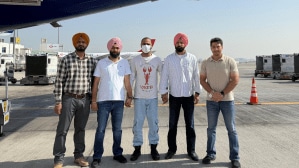Hizbollah, allies paralyse Lebanon
Opposition protesters paralysed Lebanon on Tuesday by burning tires and cars at major thoroughfares in the capital...

Opposition protesters paralysed Lebanon on Tuesday by burning tires and cars at major thoroughfares in the capital and its approaches to enforce a general strike that aims to topple the government.
Clustering in small groups to man the blazing roadblocks, opposition supporters escalated their nearly two-month protest. Commuters were stranded and business came to halt in many districts.
Scattered violence was reported involving stone throwing, fist fights and even firing of guns. Police said 14 people sustained gunshot wounds in disturbances between opposition supporters and pro-government activists in central and northern Lebanon.
Michel Aoun, a senior opposition leader, told Al-Arabiya television that the seven wounded were opposition members. Several people were injured in scuffles in Beirut as well as in nearby places.
Police and troops deployed in the thousands across the country worked to open roads, sometimes negotiating with protesters, but they refrained from using force. In some instances, the military separated the two opposing sides who exchange insults and stones or charged the crowds, managing to open some roads.
Troops brandishing automatic rifles and batons kept hundreds of people from each side separated and away from motorists, and made few arrests on the coastal highway north of Beirut near the Christian port city of Jounieh. Shots were fired in the air, apparently by security forces to disperse the crowds.
Clashes took place in areas of the capital and around the country residents are divided between government supporters and opposition forces.
–SAM F. GHATTAS
Hizbollah chief Sheik Hassan Nasrallah and other opposition leaders called the strike that was backed by labour unions. Prime Minister Fuad Siniora urged Lebanese to ignore the call, a move endorsed by banking associations and business leaders.
Soldiers and firefighters moved in to remove the obstacles, but black clouds could be seen billowing into the air around the capital and on major highways in testament to their limited success.
Witness accounts and television footage suggest that the opposition had shut down many neighbourhoods in Beirut as well as areas around the country. But Beirut Mayor Abdel-Munim Ariss, put on a brave face, telling Al-Arabiya television the city was functioning normally.
Many workers stayed home, either in support of the strike or simply fearing violence. Some schools which had earlier said they were open senit mobile text messages to parents announcing closures because of the unrest.
Blazing roadblocks cut off the road to Beirut international airport and the highway linking Beirut with the mountains and the road to Damascus.






- 01
- 02
- 03
- 04
- 05

























